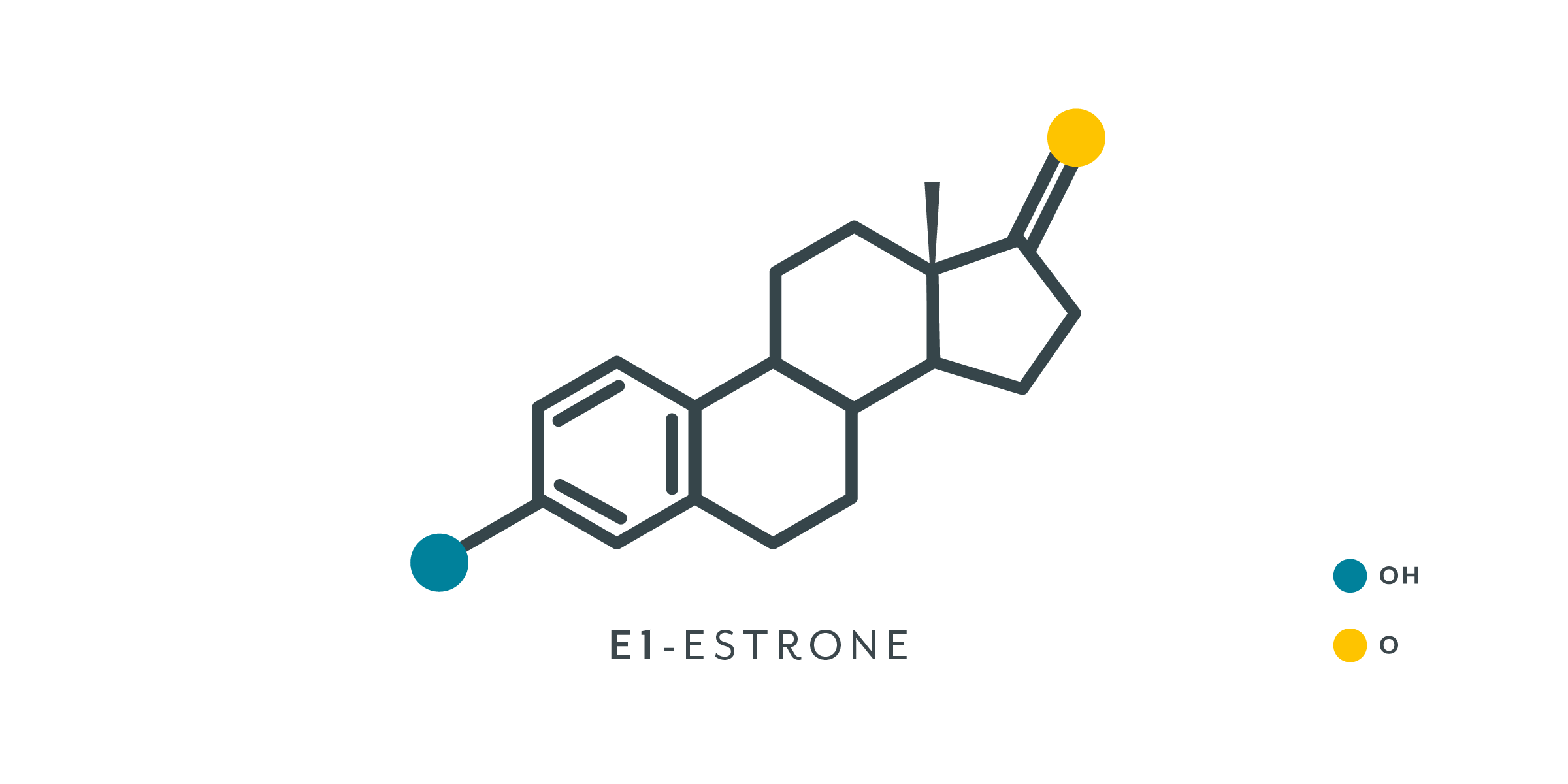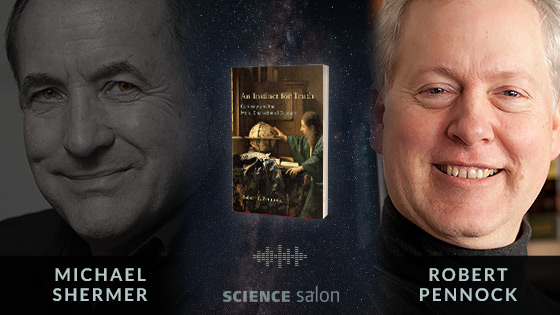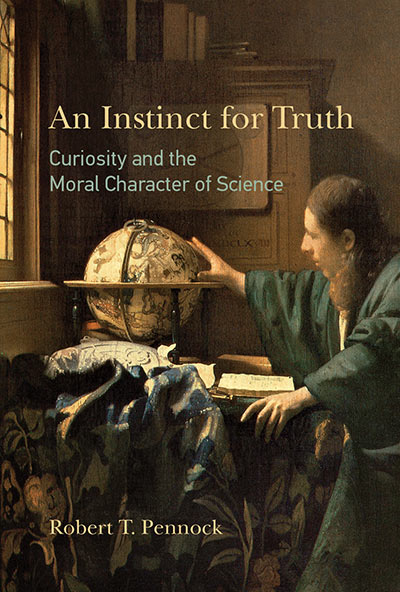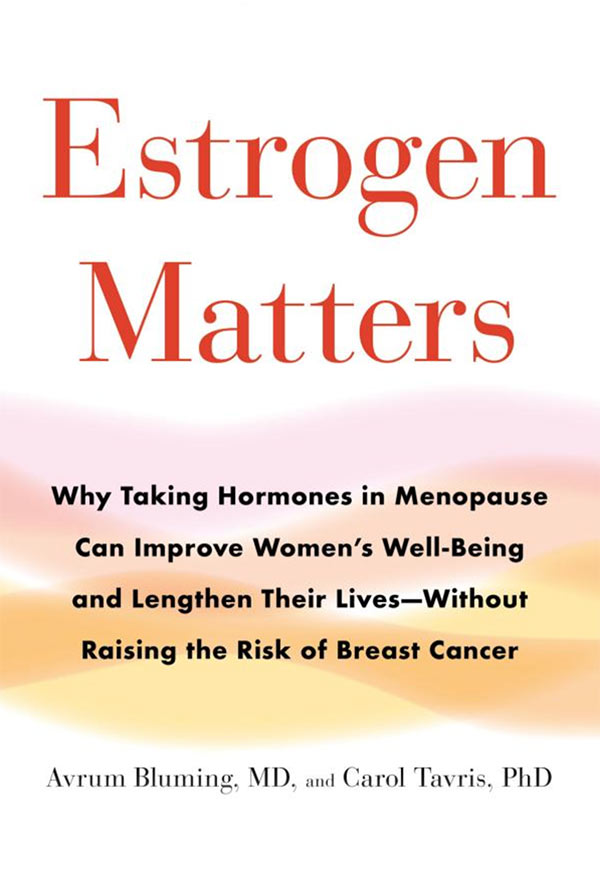SCIENCE SALON # 98
Michael Shermer with Robert Pennock — An Instinct for Truth: Curiosity and the Moral Character of Science
An exploration of the scientific mindset — such character virtues as curiosity, veracity, attentiveness, and humility to evidence — and its importance for science, democracy, and human flourishing. Exemplary scientists have a characteristic way of viewing the world and their work: their mindset and methods all aim at discovering truths about nature. In An Instinct for Truth, Robert Pennock explores this scientific mindset and argues that what Charles Darwin called “an instinct for truth, knowledge, and discovery” has a tacit moral structure — that it is important not only for scientific excellence and integrity but also for democracy and human flourishing. In an era of “post-truth,” the scientific drive to discover empirical truths has a special value. Taking a virtue-theoretic perspective, Pennock explores curiosity, veracity, skepticism, humility to evidence, and other scientific virtues and vices. Shermer and Pennock discuss:
- the nature of science
- why Intelligent Design creationists are not doing bad science — they’re not doing science at all
- what to do with anomalies not explained by the current paradigm
- the role of outsiders in science
- what scientific training does to develop the virtues of science
- how authority is different from expertise
- when experts pronounce on ideas outside their field
- fraud in science and why it happens
- why scientists are skeptical of UFOs, ESP, bigfoot, and the like
- falsification of a scientific hypothesis vs. positive evidence in support of a scientific hypothesis
- the naturalistic fallacy and the Is-Ought problem, and
- the ethics of autonomous vehicles and the trolley problem.
Robert T. Pennock is University Distinguished Professor of History, Philosophy, and Sociology of Science at Michigan State University in the Lyman Briggs College and the Departments of Philosophy and Computer Science and Engineering. He is the author of Tower of Babel: The Evidence Against the New Creationism.
Listen to the podcast via Apple Podcasts, Spotify, Google Podcasts, Stitcher, iHeartRadio, and TuneIn.
Check Us Out On YouTube.
Science Salon • Skeptic Presents • All Videos
You play a vital part in our commitment to promote science and reason. If you enjoy the Science Salon Podcast, please show your support by making a donation.
THE GREAT COURSES PLUS
Get One Free Month Using Michael Shermer’s Special Discount Link Below
We are now working with The Great Courses to bring you a special offer for Unlimited Access to Over 11,000 Video and Audio Lectures in Science, Math, History, Photography, and more… Read the following note from Michael Shermer to learn more.
As most of you know I consume a lot of online content while I’m driving, cycling, hiking, or doing chores around the house, and for years you’ve heard or seen me posting on social media The Great Courses I’ve been taking, for example:
- Professor Patrick Grim’s The Philosopher’s Toolkit: How to be the Most Rational Person in Any Room.
- Professor Richard B. Spence’s The Real History of Secret Societies, and
- Professor Daniel Breyer’s Understanding the Dark Side of Human Nature.
In the past I would purchase individual courses, but with The Great Courses Plus program you can subscribe to the service and listen to individual lectures — or entire courses — from a huge variety of courses from their catalogue.
With The Great Courses Plus program I often skip around and listen to lectures from different courses, depending on what, exactly, I’m interested in hearing that particular day. For example, The Philosopher’s Toolkit includes 24 30-minute lectures that teach you, for example, how to think like Artistotle, the power of thought experiments, the difference between cool rationality and hot thought, why we make mistakes, how to win debates, and near and dear to my heart, how to think scientifically.
For a limited time only, they are offering my listeners an entire month for free.
But to start your free month trial, you must sign up today using my special promotional URL: thegreatcoursesplus.com/salon

Sociologist and Certified Sex Therapist Marty Klein, Ph.D. reviews Estrogen Matters: Why Taking Hormones in Menopause Can Improve Women’s Well-Being and Lengthen Their Lives — Without Raising the Risk of Breast Cancer by Avrum Bluming, M.D. and Carol Tavris, Ph.D. (New York: Little, Brown Spark, 2018).
Image above: courtesy of Clue. Used with permission. Illustrations by Marta Pucci, from “Estrogen 101: Getting to know our hormones.”
Why Estrogen Matters
This is a useful, readable book. It is co-authored by an oncologist and a social psychologist, each with decades of practice challenging the conventional wisdom of their respective fields. And although it provides important healthcare information and recommendations for millions of people, it goes far beyond that.
Estrogen Matters starts as a mystery story: Who killed hormone replacement therapy (HRT)? The book answers that question, which involves a range of people — researchers whose bias influenced both what they saw and what they ignored in their own data; journalists who reported scare stories without reading or understanding the data; and physicians too busy to read original research themselves. This story, sadly, is a familiar one: it’s about the power of a paradigm to blind people to evidence that doesn’t fit — or which disconfirms — what they think they know. The result is today’s public confusion about the role of estrogen in a healthy life. Estrogen Matters aims to end that confusion.
The book begins in 1988, when Dr. Bluming’s 45-year-old wife was diagnosed with breast cancer. After a lumpectomy, chemotherapy, and radiation, Martha was cancer-free (and remains so, past age 70). But the chemotherapy pushed her into menopause, with intense symptoms including hot flashes, sleep problems, and worst of all, difficulty concentrating. So Dr. Bluming set out to test — and ultimately to question — the assumption that estrogen causes breast cancer. What, he wondered, did the evidence say about giving estrogen to women who have survived breast cancer? Was it safe, or, as many assumed, just adding hormonal fuel to the malignancy’s fire?
At that time there was already a half-century of evidence of estrogen’s benefits for middle-aged women. And in addition to reducing the physical, emotional, and sexual symptoms of menopause, estrogen’s other benefits were also well-documented. The hormone significantly reduces the risks of heart disease, osteoporosis, and Alzheimer’s — all of which are far more common than breast cancer. […]













